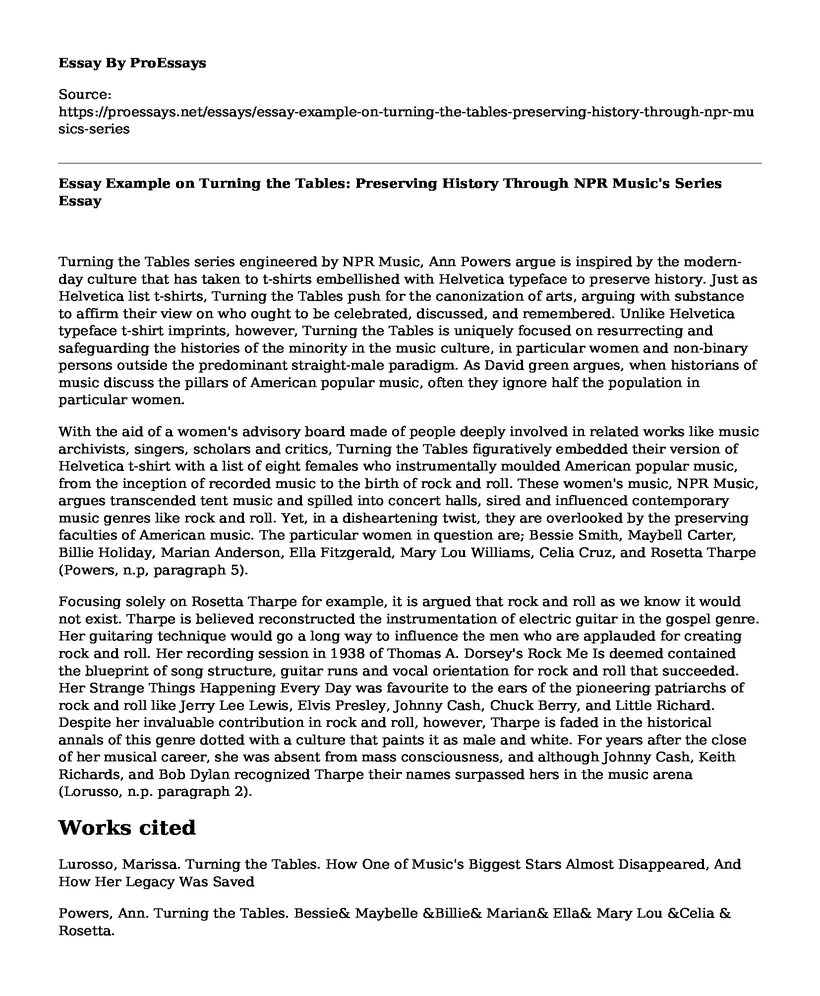Turning the Tables series engineered by NPR Music, Ann Powers argue is inspired by the modern-day culture that has taken to t-shirts embellished with Helvetica typeface to preserve history. Just as Helvetica list t-shirts, Turning the Tables push for the canonization of arts, arguing with substance to affirm their view on who ought to be celebrated, discussed, and remembered. Unlike Helvetica typeface t-shirt imprints, however, Turning the Tables is uniquely focused on resurrecting and safeguarding the histories of the minority in the music culture, in particular women and non-binary persons outside the predominant straight-male paradigm. As David green argues, when historians of music discuss the pillars of American popular music, often they ignore half the population in particular women.
With the aid of a women's advisory board made of people deeply involved in related works like music archivists, singers, scholars and critics, Turning the Tables figuratively embedded their version of Helvetica t-shirt with a list of eight females who instrumentally moulded American popular music, from the inception of recorded music to the birth of rock and roll. These women's music, NPR Music, argues transcended tent music and spilled into concert halls, sired and influenced contemporary music genres like rock and roll. Yet, in a disheartening twist, they are overlooked by the preserving faculties of American music. The particular women in question are; Bessie Smith, Maybell Carter, Billie Holiday, Marian Anderson, Ella Fitzgerald, Mary Lou Williams, Celia Cruz, and Rosetta Tharpe (Powers, n.p, paragraph 5).
Focusing solely on Rosetta Tharpe for example, it is argued that rock and roll as we know it would not exist. Tharpe is believed reconstructed the instrumentation of electric guitar in the gospel genre. Her guitaring technique would go a long way to influence the men who are applauded for creating rock and roll. Her recording session in 1938 of Thomas A. Dorsey's Rock Me Is deemed contained the blueprint of song structure, guitar runs and vocal orientation for rock and roll that succeeded. Her Strange Things Happening Every Day was favourite to the ears of the pioneering patriarchs of rock and roll like Jerry Lee Lewis, Elvis Presley, Johnny Cash, Chuck Berry, and Little Richard. Despite her invaluable contribution in rock and roll, however, Tharpe is faded in the historical annals of this genre dotted with a culture that paints it as male and white. For years after the close of her musical career, she was absent from mass consciousness, and although Johnny Cash, Keith Richards, and Bob Dylan recognized Tharpe their names surpassed hers in the music arena (Lorusso, n.p. paragraph 2).
Works cited
Lurosso, Marissa. Turning the Tables. How One of Music's Biggest Stars Almost Disappeared, And How Her Legacy Was Saved
Powers, Ann. Turning the Tables. Bessie& Maybelle &Billie& Marian& Ella& Mary Lou &Celia & Rosetta.
Cite this page
Essay Example on Turning the Tables: Preserving History Through NPR Music's Series. (2023, Mar 26). Retrieved from https://proessays.net/essays/essay-example-on-turning-the-tables-preserving-history-through-npr-musics-series
If you are the original author of this essay and no longer wish to have it published on the ProEssays website, please click below to request its removal:
- I Pagliacci Opera Analysis Essay
- Analysis of the "Outsourced" Movie - Essay Sample
- Research Paper on Media Influences on Aggression
- Classical Music Concert Report
- Research Paper on Talk Shows: Exploiting Victims for Entertainment?
- Essay Example on Mystery and Vanishing: Picnic at the Hanging Rock
- Essay Example on Exploring the Arts: A Journey of Passion and Discovery







